Stone Picker Rentals: A Comprehensive Guide
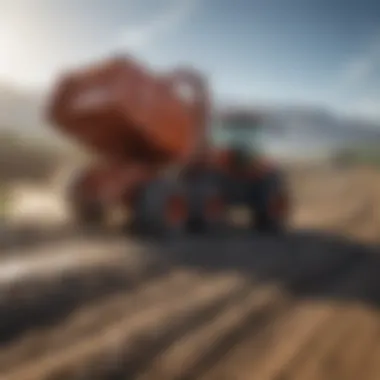
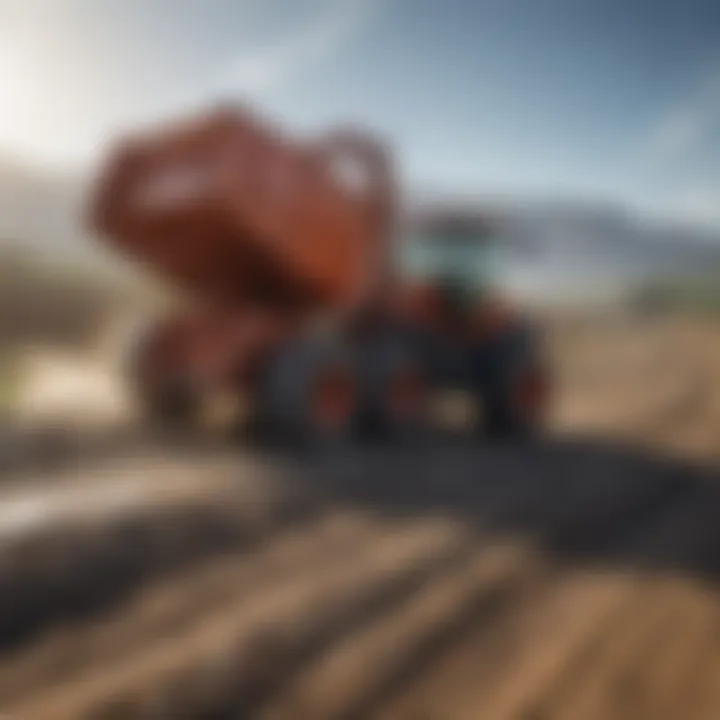
Intro
When it comes to farming, there’s a saying: “You reap what you sow.” But, before you can even think about planting, there’s another saying to consider: “Out of sight, out of mind.” In this case, the problem is rocks. For farmers, stones can be the bane of their existence, disrupting soil health, damaging equipment, and inhibiting crop growth. Thankfully, stone pickers offer a practical solution to this age-old problem.
In this guide, we'll dig into stone picker rentals, discussing their undeniable role in agriculture. Whether you're a seasoned farmer or just dipping your toes into the soil, knowing how these machines work and why renting them can be a game changer is crucial. From understanding their mechanics to finding the right one for your needs, we’ll leave no stone unturned.
Topic Overview
Definition and Importance
At its core, a stone picker is a machine that collects stones from the soil. They come in various designs, but their primary function remains the same: to efficiently separate rocks from tillable earth. Why is this important? Well, for starters, removing stones prepares the land for planting. It allows for better seed-to-soil contact, facilitates smoother machinery operation, and ultimately leads to healthier crops.
Brief History and Evolution
The concept of picking stones is not new. Farmers have been at it for centuries, often relying on manual labor and basic tools. But as agriculture evolved, so did the methods of stone removal. The advent of machinery in farming has revolutionized this practice. Early models were cumbersome and required significant effort, yet today’s stone pickers are equipped with advanced features like hydraulic systems and GPS technology that streamline the process.
Key Techniques and Innovations
Sustainable Farming Practices
In a world increasingly mindful of sustainability, stone pickers are a vital part of eco-friendly farming practices. By reducing the reliance on chemical treatments for weed control and soil improvement, stone pickers promote healthy, sustainable farming. They help maintain soil integrity and encourage biodiversity, as bare patches of land often lead to erosion and habitat destruction.
Advanced Agronomic Technologies
Modern stone pickers utilize technology to enhance efficiency and precision. Many are designed with integrated sensors that can detect soil conditions and adjust their operational parameters accordingly. This means that farmers can optimize the timing of their stone picking, ensuring it aligns perfectly with their planting schedule. Not only does this save time but also improves yield potential.
Practical Applications
Step-by-Step Guides
- Assess Your Land: Evaluate the type and amount of stones present.
- Choose the Right Picker: Depending on your land size and stone volume, select an appropriate stone picker model.
- Plan Rental Timing: Schedule your rental during the optimal period for your planting season.
- Execute the Process: Follow the operational manual to effectively remove stones. This typically involves aligning the machine correctly and ensuring it functions smoothly.
- Maintain Regular Checks: Regularly inspect your working area for remaining stones, as occasional oversight can lead to rework.
Case Studies or Real-World Examples
Many farmers have shared success stories of how renting stone pickers transformed their land. For instance, a small farm in Ohio managed to increase its corn yield by 20% after renting a stone picker to clear fields that hadn’t seen maintenance in years. Another example from a vineyard in California showed significant improvements in grape quality after investing in stone removal just ahead of the planting season. These real-world instances underscore the efficiency and effectiveness of stone pickers in agricultural practice.
"In agriculture, removing obstacles means opening doors to productivity. Stone pickers are that key for many farmers."
As we venture deeper into this guide, we will further explore specifics about stone pickers, rental services, operational principles, and much more. Understanding these concepts can empower farmers to make informed decisions about their land and equipment needs.
Understanding Stone Pickers
Stone pickers play a crucial role in modern agriculture, particularly in fields where stone debris could hinder crop growth or damage equipment. They aid farmers in creating a more efficient and fruitful working environment. Understanding the different types of stone pickers available for rent is essential for farmers looking to optimize their land and ensure the health of their crops.
Definition and Purpose
At its core, a stone picker is a specialized piece of machinery designed to remove stones from soil, leaving behind a clean planting area. Traditionally, farmers dealt with stones manually, which is both labor-intensive and time-consuming. With the advent of stone pickers, this burden has eased significantly. The purpose of these machines goes beyond merely picking stones; they also help to prepare the soil for planting, making it more suitable for crop growth. The efficiency and speed at which stones can be removed allows farmers to focus on their core processes without the constant worry of obstacles in their fields.
Types of Stone Pickers
There’s no one-size-fits-all when it comes to stone pickers. Each type serves a different purpose based on the specific needs of a farm. Here are the primary types:
Mechanical Stone Pickers
Mechanical stone pickers are popular due to their straightforward functionality. Using a series of rotating tines, they dig into the soil and pull up stones. A key characteristic of these machines is their ability to work efficiently on relatively flat terrains. They are favored for large farming operations due to their cost-effectiveness and workable design. However, they can struggle in rocky or uneven surfaces, where depth of stones varies. This can affect their overall performance, making them less favorable for certain regions.
Hydraulic Stone Pickers
Hydraulic stone pickers offer a higher level of versatility. The hydraulic system allows for greater control over operation, making it easier to handle varying soil conditions. Their key advantage is the ability to operate efficiently in rough terrains where mechanical pickers might falter. These machines tend to have a larger capacity, meaning they can collect more stones at once. A unique feature is their adjustable width, which makes them suitable for a range of field sizes. On the flip side, they may come at a higher rental cost and can be more complicated to operate compared to their mechanical counterparts.
Manual Stone Pickers
Manual stone pickers, while less commonly seen today, provide an alternative for small-scale farming or gardens. Typically, these tools are simple devices that require human force to operate. They are particularly useful in areas where larger machinery cannot access due to space limitations. The key characteristic of these manual pickers is their simplicity and low cost. However, they require significant physical effort and can be less efficient than mechanical and hydraulic options. One unique feature is that they can sometimes be adjusted for different soil conditions, making them versatile despite their manual nature. Their major disadvantage lies in speed; using a manual picker can dramatically slow down the stone clearing process.
Understanding the different types of stone pickers is crucial for making informed decisions that enhance farm productivity and soil health.
Each type of stone picker has its own set of advantages and limitations. Knowing these can help farmers select the best option for their specific field conditions. The proper use of stone pickers can significantly impact yield and overall farm efficiency.
The Benefits of Renting Stone Pickers


Renting stone pickers offers several notable advantages that can greatly enhance the productivity of agricultural operations. First and foremost, it reduces the financial burden on farmers, making it a practical choice for many. Additionally, it allows access to modern technology without the associated costs of ownership. Furthermore, handling maintenance issues becomes significantly less stressful since that responsibility often lies with rental services. Let’s dive into these benefits further.
Cost-Effectiveness
The decision to rent stone pickers boils down to saving hard-earned money. For many farmers, purchasing equipment outright can be a bit like trying to squeeze water from a stone—it's tough and often ends up not worth the effort. Rental services provide a cost-effective solution by charging on a per-use basis, which means you only pay for the equipment when you truly need it.
For example, if a farmer only works a few acres of land with rocky soil once or twice a year, the expense of owning a stone picker can quickly spiral out of control with maintenance, insurance, and storage fees. Rental options, however, can drastically cut these costs. By renting, farmers can divert those funds into other necessary farm operations or invest in crop management tools.
Access to Latest Technology
In an industry where every little edge counts, having access to cutting-edge technology can be a game changer. Rental services usually stock the latest models of stone pickers, equipped with newer features and enhancements that increase efficiency.
Imagine using a state-of-the-art stone picker equipped with advanced hydraulic systems or smart sensors that optimize the picking process. These innovations not only reduce time spent on the task but also improve soil quality, leading to better crop yields. Furthermore, when new models become available, rental companies often roll them into their inventory, making it easier for farmers to upgrade their equipment without breaking the bank.
"By renting stone pickers, farmers access cutting-edge technology without the associated risks of ownership."
Maintenance-Free Experience
Engaging with rented stone pickers also means stepping away from maintenance headaches. The onus of keeping machinery in good working order often falls to the farmers when they own equipment. This can lead to undesired outages right at harvest time or the planting season. However, with renting, the rental company typically handles the upkeep and repairs, ensuring that the equipment is in optimal condition.
This lack of responsibility not only saves time but also allows farmers to focus on more pressing tasks, from planting to harvesting. After all, the last thing a farmer wants is to have a stone picker down when they need it most.
Deciding Between Renting and Buying
When it comes to stone pickers, the question of whether to rent or buy can really make or break your budget planning for the agricultural season. Each option has its own merits, and fence-sitting can lead to unexpected costs, delays, or even compromised quality of your soil. Hancing wise choices here not only saves you money but also ensures you have the right tools when you need them. Let’s break down the crucial considerations.
Assessing Frequency of Use
How often do you find yourself needing a stone picker? If you're in a small operation or even a hobby farm where stone removal happens just once or twice a year, renting might suit you just fine. Renting gives you flexibility, allowing you to access the latest models and technologies without the burden of long-term ownership.
On the flip side, if you are in large-scale production or have multiple fields to maintain where stones are a recurrent problem, buying could be the better route. You won't want to keep shelling out rental fees for frequent use—it gets costly mighty quick. Also, owning a stone picker ensures you can operate at your own pace, without the clock ticking on rental agreements.
"The right choice hinges on how often you need that trauma and toil of stone collection to happen on your field."
Evaluating Budget Constraints
Your financial roadmap gives clear direction on whether renting or buying fits your strategy. Clearly, renting is a more affordable short-term option, with no big upfront costs and maintenance responsibilities. Rental fees can range significantly, depending on the type of stone picker you need, but they can often be planned around project budgets. A classic piece of advice: always read the fine print on rental agreements. Hidden fees have a knack for catching people off guard.
If your coffers are overflowing, it might make sense to invest in a stone picker to mitigate long-term costs. Purchasing means you don’t have to worry about mounting rental fees over time. However, the acquisition cost combined with maintenance and repair expenses must not be underestimated. A poor financial decision here could leave you high and dry when unexpected costs roll in.
Considering Storage and Transportation Issues
Owning gear like stone pickers means you also have to consider where you're going to put it. No one wants to rent just to find that there’s no room in the barn or garage to store it. Proper storage keeps equipment safe and functional. Not to mention, transportation issues arise—do you have a suitable truck or trailer to haul your purchase?
Renting, on the other hand, comes with fewer worries on this front. You pick up the equipment when needed and return it afterward. It’s like having a tool library just for your stone-picker needs. With all that being said, if you are buying, make sure you also understand the logistics of transporting the heavy equipment back to your property post-purchase.
In summary, deciding between renting and buying a stone picker is a balancing act. By considering frequency of use, budget, and transportation issues, you can make a well-informed choice that aligns with your farming goals.
Operational Aspects of Stone Pickers
Understanding the operational aspects of stone pickers is essential, especially for those involved in agricultural endeavors. These machines not only save time but also enhance the efficiency of stone removal processes, which, in turn, helps in the preparation of soil for planting. The mechanics involved in stone collection and the techniques for soil preparation hold immense significance in the overall operation of these machines. This section will delve into how stone pickers function and the key characteristics that make them effective tools for farmers.
How Stone Pickers Work
Mechanics of Stone Collection
At the heart of every stone picker lies its mechanics of collection. The design of these devices often includes rotating bars or tines that dig into the ground and lift stones to the surface. This action works like a charm, separating stones from soil while minimizing the disturbance to the latter. Farmers appreciate this feature because it promotes a healthier soil structure, which is critical for crop growth.
A key characteristic of this mechanism is the pickup height adjustment. Being able to adjust how deep the machine digs allows users to customize their operation based on soil conditions. This adaptability makes it a useful choice for different terrains, whether they are rocky or softer lands.
However, it is important to note that while efficiency is a strong selling point, there could be potential drawbacks. For instance, in extremely soft soils, the machine might struggle to pick up stones effectively, leading to incomplete removal. But overall, the mechanics of collection have made stone pickers a favorite among farmers eager to streamline their operations.
Soil Preparation Techniques
Soil preparation is another critical element of using stone pickers. This technique focuses on creating the right conditions for planting, which is paramount for achieving good yields. Stone pickers not only help in clearing stones but also contribute to soil aeration. When stones are removed, it helps in loosening the soil, enabling better water infiltration and root penetration.
A hallmark of effective soil preparation techniques is the ability to incorporate the collected debris back into the soil. Some modern stone pickers are equipped with features that allow for this, turning waste into nutrients for the plants. This dual action of stone removal and soil enhancement makes such machines a pivotal choice in sustainable farming.
Yet, it's important to pay attention to the potential challenges. Over-preparation of the soil can lead to compaction, which is counterproductive. Mindful operation is needed to ensure that the soil remains healthy, balancing between removal and preservation.
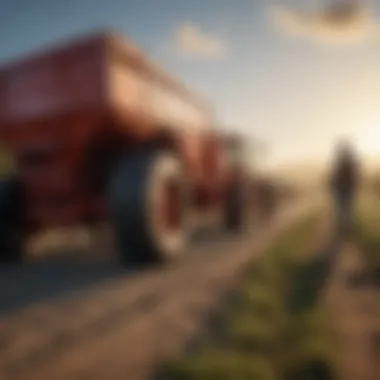
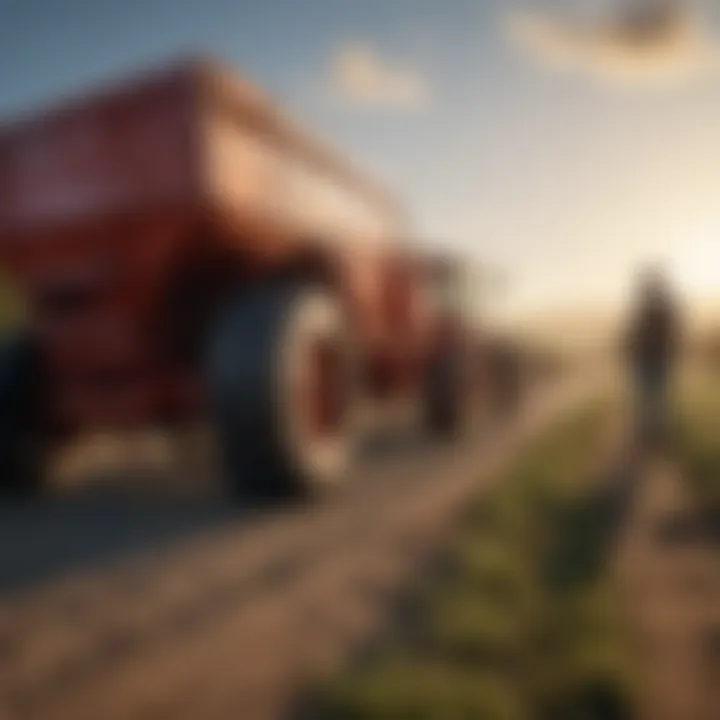
Key Features to Look For
Size and Capacity
When selecting a stone picker, size and capacity are vital factors to consider. A larger stone picker can handle greater volumes of stones, making it suitable for extensive farms. Conversely, smaller models are ideal for gardens or smaller fields, allowing for better maneuverability. The right size can enhance productivity; therefore, understanding the specific requirements of your land is crucial.
A unique aspect of size and capacity is the ability to attach these machines to various tractors. This flexibility means a farmer can select a stone picker tailored to their tractor's strength and capacity, optimizing the overall efficiency of the operation.
Ease of Operation
Ease of operation stands out as a key characteristic when assessing stone pickers. The level of user-friendliness can significantly affect productivity. Features such as intuitive controls or electronics that help guide operation can make a world of difference, particularly for less experienced operators. An easy-to-use machine allows farmers to focus on their work rather than getting bogged down by complex controls.
However, one should also be cautious; machines with overly complicated systems, designed for advanced users, may deter beginners. Finding the right balance between user-friendliness and functionality is essential for promoting effective stone removal.
Durability
Durability in stone pickers cannot be overlooked. Given that these machines often face harsh conditions - from rocky terrains to wet soil - a robust build is essential. Quality materials and construction will yield a longer lifespan, ensuring users get their money’s worth.
A distinctive feature worth mentioning is corrosion resistance. Machines that incorporate this capability can withstand exposure to various elements, prolonging their usability. No one wants to worry about a rental machine falling apart halfway through a job.
In summary, understanding the operational aspects of stone pickers aids in choosing the right one for your needs. By focusing on how they work, key features, and the potential challenges, farmers can better navigate the rental landscape, ensuring that they select the most effective tool for their stone removal and soil preparation tasks.
Selecting a Rental Service
When it comes to utilizing stone pickers, selecting the right rental service is crucial to ensure you make the most out of your agricultural endeavors. The right service can affect not only the efficiency of your operations but also your overall satisfaction with the rental experience. With various companies available, taking the time to research carefully can yield significant benefits that impact the success of your project.
Researching Local Rental Companies
The first step in the selection process is to identify suitable local rental companies that offer stone pickers. Start by conducting an online search to find businesses in your area that specialize in agricultural machinery rental.
- Local Directories: Websites like LinkedIn and Yelp can provide valuable customer reviews which can guide your choices.
- Word of Mouth: Don’t underestimate the power of recommendations from fellow farmers or local agricultural co-ops. Personal experiences can often reveal insights not seen in reviews.
- Social Media Groups: Platforms like Facebook or Reddit often have communities where local farmers discuss recent rentals and experiences with different companies. Joining these groups may provide you with up-to-date information about local rental services.
Once you've gathered a list of potential services, it would be wise to visit their websites and contact them for more specific inquiries regarding availability, pricing, and the types of stone pickers offered.
Evaluating Customer Service
Good customer service can be a game-changer in your rental experience. It’s not just about renting equipment; it’s about having a reliable partner who understands your needs. When speaking with representatives from the rental companies, consider the following factors:
- Responsiveness: How quick are they to answer your questions? A company that is attentive can make all the difference, especially in those busy planting seasons.
- Knowledgeability: Are they able to provide you with insights about which type of stone picker suits your needs? Adequate knowledge reflects a commitment to customer satisfaction.
- Support Policies: Inquire about the procedures for troubleshooting or any support available throughout the rental period. A reliable service should offer assistance, should issues arise while using the equipment.
Understanding Rental Terms
Before making a final decision, it's essential to comprehensively understand the rental terms laid out by each company.
- Duration of Rental: Determine whether you are looking at short-term or long-term rentals, as some businesses may have different pricing structures for varied durations.
- Insurance and Liability: Clarify what insurance options are available and who is liable in the event of damage to the equipment or accidents during use. This could save you a heap of trouble later.
- Maintenance Expectations: Know who is responsible for maintenance during the rental period. Some companies may include these services, while others may expect you to handle minor repairs yourself.
"A clear understanding of rental terms is vital; it helps you avoid unexpected costs and sets realistic expectations for the equipment's use."
- Return Conditions: Familiarize yourself with how and when to return the equipment to avoid potential fines. Understanding these conditions encourages responsible usage of the equipment.
In summary, being thorough in selecting a rental service sets the foundation for effective and smooth stone picking operations. Putting effort into research and ensuring good customer support coupled with a full understanding of rental terms will undoubtedly enhance the overall experience.
Maintenance Tips for Optimal Functioning
Ensuring that your stone picker operates at peak performance is essential for achieving the best results in your agricultural endeavors. Not only does proper maintenance extend the lifespan of the equipment, but it also enhances its efficiency, reducing downtime and preventing costly repairs. This section delves into routine inspections, cleaning and storage practices after use, and follow-up repairs to keep your stone picker running smoothly.
Routine Inspections
Regular inspections are the backbone of good maintenance practices. This process involves a thorough check-up of key components before, during, and after use. Farmers should inspect belts and chains for any signs of wear and tear, ensuring they are in working order. Additionally, looking over the blades and rakes will help catch issues before they become severe. Observing for loose bolts, rust, or any other irregularities can prevent breakdowns that might disrupt crucial work periods.
Consider adopting a checklist for routine inspections:
- Check hydraulic connections for leaks.
- Confirm that all safety features are functional.
- Ensure that the tires are inflated to the correct pressure.
By being diligent with inspections, operators can mitigate the risk of equipment failure and keep productivity high.
Cleaning and Storage After Use
Once the day's work is done, the cleaning and proper storage of your stone picker cannot be overlooked. Cleaning not only reduces the build-up of debris and soil but also prevents corrosion that can compromise metal components. It's recommended to use high-pressure water to clear away dirt, mud, and stones lodged in the machinery. After cleaning, inspect for any damages that could have occurred during operations.
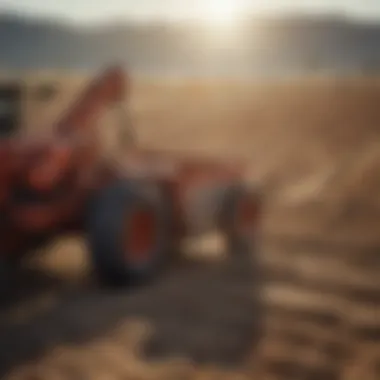
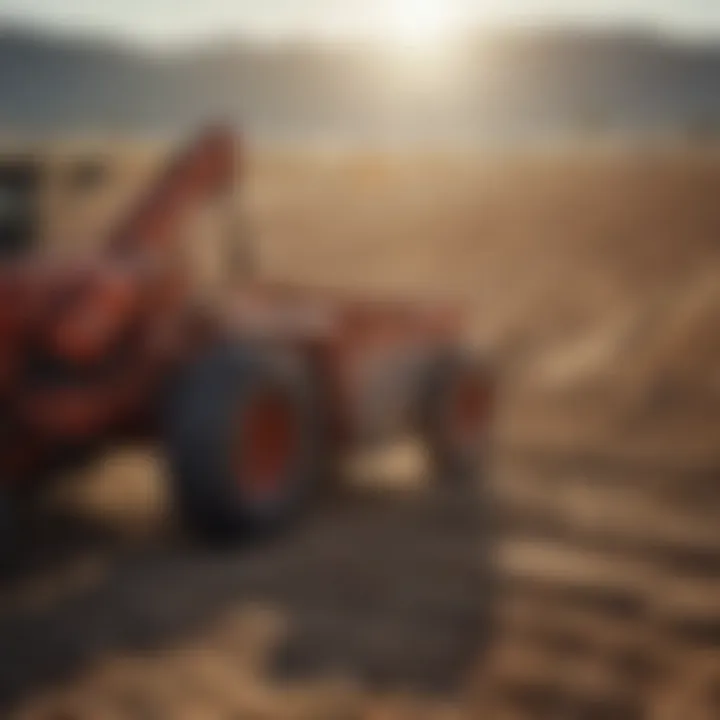
For effective storage, ensure the stone picker is kept in a dry and secure location. Exposure to moisture can lead to various problems, such as rust or mold growth on hoses and cables. If possible, cover the equipment with a breathable tarp to allow ventilation while keeping it protected from dust and moisture.
Follow-up Repairs and Checks
Post-operation, it’s crucial to schedule follow-up repairs for any identified issues during inspections and cleaning. Being proactive about repairs improves the longevity of the equipment and ensures that all systems function optimally when needed. It’s wise to maintain a relationship with a qualified technician familiar with your stone picker model, as they can provide specialized support when deeper issues arise.
Moreover, keeping a log of repairs and maintenance performed helps track the equipment’s history. This particular practice can be beneficial for making rental decisions in the future or when preparing for the busy seasons. Evaluate the following after every operation:
- Replacement needs for worn parts.
- Adjustments for optimal alignment.
- Lubrication of moving parts.
By adhering to these maintenance tips, agricultural enthusiasts can significantly improve the performance and durability of their rented stone pickers, ensuring they receive the best return on their investment.
Regional Availability of Stone Pickers for Rent
When it comes to getting your hands on stone pickers, regional availability plays a big role. It’s not just about picking up the closest one to you; it’s about understanding the local landscape and what each area offers. This section breaks down the factors that could affect your search for those essential machines in different regions.
Geographic Considerations
While stone pickers can be found in many places, their availability often hinges on geographic factors. Regions with a rich agricultural landscape, like the Midwest in the United States or the Pampas in Argentina, tend to have a higher concentration of rental options. Why? Because the demand for these machines is significantly higher here. As farmers look to optimize their fields, having access to reliable equipment becomes paramount. Conversely, areas with less farming activity might have limited choices, making it tough for farmers to find the tools they need when that rocky soil needs clearing.
One should also keep an eye on the terrain type and weather conditions in their area. For instance, locations with a lot of rainfall may lead to heavier soil and stones, creating an increased need for stone pickers. In contrast, dry, sandy regions might find fewer rental options, simply because the demand isn't great enough.
Local Demand Trends
Understanding local demand trends is like reading the tea leaves for farmers. A spike in demand for stone pickers can signal various things—perhaps more land is being cultivated or crop rotation practices are shifting in local farms. Seasonal trends are also key. Farmers tend to rent these machines more in the spring and fall. Knowing when demand peaks in your area will help you secure a rental at a better rate and finer condition.
Additionally, economic shifts can dictate availability. If a region is experiencing a boom in agriculture—maybe due to favorable market prices or planting incentives—more farmers will be looking for stone pickers. This could elevate rental competition, making it more challenging for individuals to find the right equipment at the right time.
Assessing both geography and local demand offers insight into when and where to look for stone pickers. It’s worth doing a bit of homework to understand how your region’s specific circumstances play into your options for renting.
"Being aware of local demand isn't just smart; it's a lifeline to agricultural success."
Whether you’re an organic farmer practicing sustainable methods or a larger scale producer, understanding these regional factors can save you time and resources when seeking stone pickers. Don't just dive in—take a moment to survey your local landscape first.
Understanding Costs and Pricing Structures
Understanding the costs and pricing structures associated with stone picker rentals is fundamental for farmers and agricultural businesses. It highlights not just the immediate outlay, but also informs broader financial planning and operational strategy. By grasping elements such as typical rental costs and regional price variations, you can make more informed decisions that will ultimately affect your bottom line.
Typical Rental Costs
When it comes to typical rental costs for stone pickers, various factors influence the pricing. Generally, rental rates can vary based on the type of stone picker, duration of the rental, and demand in your area. For mechanical stone pickers, you might find prices ranging from $200 to $400 per day, while hydraulic models could see rates between $300 to $600. Longer rental periods, say weekly or monthly, often come with negotiated discounts that can lead to better overall savings.
It's crucial to consider the costs associated with transporting the equipment. If the rental company is not local, and transportation is considered a separate charge, this could significantly affect total expenses. Additionally, some companies offer package deals that might include operators or fuel, which could be more economical in the long run.
"Understanding the typical costs of renting can prevent sticker shock and help farmers budget for seasonal needs effectively."
Comparison Across Regions
Prices often fluctuate based on geographic location due to several variables. High-demand regions, like those heavily involved in crop production, may see elevated rates for rentals, driven by high utilization. For instance, a farmer in Iowa might face higher prices compared to someone in more rural parts of Texas, where the demand for these machines is less intense.
Furthermore, the cost of living in these areas can play a significant role. Urban centers that offer advanced technology and services typically charge more, not just for the equipment, but also for the associated conveniences. This leads to an interesting dichotomy, where local demand trends can cause prices to swing dramatically.
As you assess the market, consider researching several rental companies in your locality to compare prices and services. Checking sites like reddit.com for user experiences can provide insights into whether certain services offer better value, shedding light on aspects you might not have initially considered.
In summary, having a clear picture of costs and regional pricing structures enables farmers to plan better financially and make savvy equipment rental decisions.
Future Trends in Stone Picker Rentals
As agriculture continues to evolve, the future trends in stone picker rentals hold significant importance. They not only reflect the changing dynamics of farming practices but also influence how farmers approach efficiency, productivity, and sustainability. In this section, we’ll examine two notable trends: technological advancements in stone pickers and the growing emphasis on eco-friendly practices.
Technological Advancements
In recent years, the agricultural sector has embraced myriad technological innovations, and stone picker rentals are no exception. The incorporation of modern technologies is transforming equipment functionality in ways that enhance efficiency and reduce labor costs. Here are some key technological trends to consider:
- Automated Systems: Many rental companies are now offering stone pickers equipped with advanced automation features. For instance, GPS-guided systems aid in precise positioning, ensuring thorough stone collection without leaving any behind.
- Smart Sensors: These devices can detect stone types and sizes, optimizing the picking process. As a result, farmers benefit from quicker operations and reduced wear on machinery.
- Data Integration: The future of stone pickers also involves integrating data analytics into their functions. By tracking usage patterns and maintenance needs, farmers can make informed decisions, potentially increasing lifecycle efficiency.
Advancements in technology also mean that equipment rental companies often update their fleets. This gives farmers access to cutting-edge tools without the burden of ownership.
"The convergence of technology and agriculture is revolutionizing the landscape, making it easier to manage the demands of modern farming."
Sustainability and Eco-Friendly Practices
With climate change and environmental concerns gaining traction, sustainability has climbed to the forefront of farming considerations. The stone picker rental industry is increasingly aligning with eco-friendly practices, primarily focusing on reducing the environmental footprint associated with land preparation. Here are ways in which sustainability is reflected in stone picker rentals:
- Energy-Efficient Models: The market is seeing a surge in rentals of energy-efficient stone pickers. These models consume less fuel and minimize emissions, aligning with the goals of farmers who wish to lessen their environmental impact.
- Biodegradable Materials: Some manufacturers have started utilizing materials that are less harmful to the environment. This trend is particularly appealing to environmentally conscious farmers.
- Sustainable Practices in Operations: Rental companies are adopting practices that promote sustainability, such as maintaining machinery to ensure optimal performance and reduce waste.
Farmers are increasingly aware that incorporating eco-friendly equipment into their operations not only enhances their public image but also contributes to the long-term health of the environment. Thus, stone picker rentals aligned with sustainable practices are likely to see heightened demand in the years to come.



